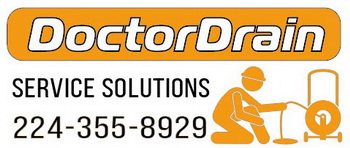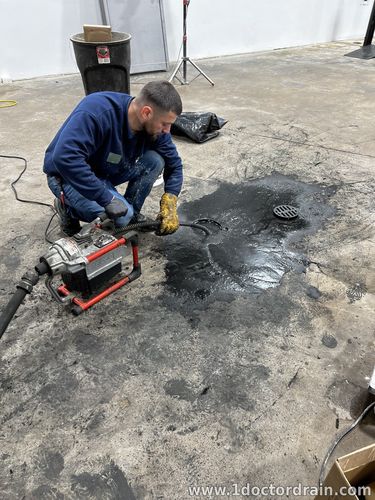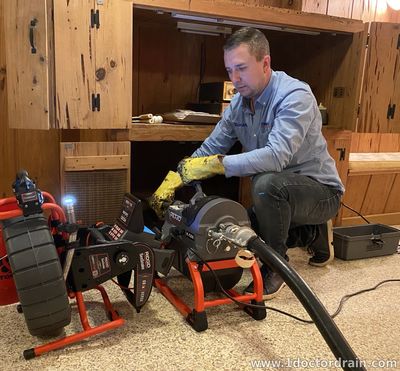Main Line Rodding Services – Keep Your Pipes Clear with Doctor Drain
A clogged main line can lead to a host of plumbing nightmares, including flooded basements, backed-up drains, and unpleasant smells. As the primary pipeline connecting your home’s plumbing to the city sewer system, the main line plays a crucial role in maintaining a clean, healthy, and functional home. At Doctor Drain, we specialize in main line rodding, a reliable solution for tackling even the most stubborn clogs and restoring your system to full efficiency.
Whether you’re dealing with a clogged drain in your kitchen, bathroom, or basement, our professional main line rodding services are designed to remove the toughest blockages and get your plumbing flowing smoothly again.
What Is Main Line Rodding?
Main line rodding is a powerful method of clearing blockages from your home’s main sewer line. Using a flexible rod or specialized cable fitted with cutting heads, main line rodding reaches deep into the pipe to break up and clear away obstructions. This process is highly effective for removing various types of clogs, from tree roots to non-flushable items like paper towels, napkins, tampons, and diapers (pampers). It’s an essential service for homeowners experiencing slow drains, clogs, or backups.
Why Main Line Rodding Is Important
When your main line gets clogged, it doesn’t just affect one area of your home—it can disrupt your entire plumbing system. All drains, from your kitchen sink to the shower drain and bathtub drain, eventually lead to the main line. If this line becomes clogged, wastewater and contaminated water can’t flow out, resulting in backups through floor drains, basement flooding, and sometimes even sewage entering your home.
Main line rodding is the best way to remove stubborn clogs and restore the function of your drains, ensuring that your home remains free of standing water, foul smells, and potential health hazards.
Common Causes of Main Line Clogs
1. Tree Roots: Over time, tree roots naturally seek moisture, and they can invade your main sewer line in search of water. Once inside the pipes, these roots grow and cause serious blockages.
2. Non-Flushable Items: Items like paper towels, napkins, tampons, diapers (pampers), and wipes don’t dissolve like toilet paper. They can clog the line and obstruct water flow, leading to backups and possible flooding.
3. Grease and Debris: Grease, oils, and food waste can build up in the main line over time, gradually narrowing the pipe and causing slow drainage or complete clogs.
4. Shower and Bathtub Drain Debris: Hair, soap scum, and dirt from showers and bathtubs can eventually make their way to the main line and contribute to blockage over time.
5. Broken Pipes: A broken pump or damaged sewer pipe can cause blockages that lead to back-ups, contaminated water, and basement flooding.
Signs You Need Main Line Rodding
If you notice any of the following issues, it may be time to schedule a main line rodding service with Doctor Drain:
• Slow or Clogged Drains: If multiple drains in your home are slow or clogged simultaneously, it could indicate a blockage in the main line.
• Sewage Backup in Basement or Floor Drains: Wastewater backing up through a floor drain is a common sign of a main line clog. It may also lead to a flooded basement.
• Foul Smells: A lingering sewer smell throughout your home suggests a blockage or backup in the main line that prevents wastewater from flowing properly.
• Toilet Backups: If flushing one toilet causes a backup in another, or if your toilet drains unusually slowly, there may be an issue with the main line.
• Water Backups in Showers or Bathtubs: A clog in the main line can cause water to back up through shower and bathtub drains, often accompanied by an unpleasant smell.
The Dangers of Ignoring Main Line Clogs
Ignoring a main line clog can lead to costly and damaging consequences. When wastewater can’t exit through the main sewer line, it may start to back up through floor drains and into your basement, creating a serious flooding issue. This standing water isn’t just inconvenient; it’s also contaminated water that can carry bacteria and pathogens into your home. Plus, the water damage can harm walls, floors, and furniture, requiring expensive repairs.
Blocked drains and standing water also encourage mold growth, which poses a health risk, especially to those with respiratory conditions. Additionally, untreated clogs can increase pressure on your plumbing system, potentially leading to broken pumps and cracked pipes that can turn a simple clog into an extensive repair job.
Doctor Drain’s Main Line Rodding Process
At Doctor Drain, we take a thorough, efficient approach to main line rodding. Our team of skilled professionals is equipped with state-of-the-art tools and years of experience in handling all types of main line issues. Here’s what you can expect from our main line rodding service:
1. Inspection: We begin with a comprehensive inspection of your main line using advanced cameras and diagnostic equipment to locate the clog and determine its cause.
2. Rodding Process: We use a specialized rod or cable to break up the blockage, whether it’s tree roots, grease, or non-flushable items like paper towels and tampons.
3. Clearing the Pipe: The rodding process thoroughly clears the main line, restoring free water flow and eliminating potential backup points.
4. Final Inspection and Testing: After rodding, we re-inspect the line to ensure the clog is gone and check that water flows smoothly throughout your system.
Prevention Tips for Main Line Clogs
Keeping your main line clear doesn’t have to be difficult. Follow these simple tips to help prevent clogs:
1. Avoid Flushing Non-Flushable Items: Only flush toilet paper. Items like napkins, tampons, pampers, and paper towels should never go down the toilet, as they can easily cause a clogged drain.
2. Dispose of Grease Properly: Never pour grease or oil down your drains, as they can solidify and stick to the walls of your pipes, creating stubborn clogs.
3. Watch for Tree Roots: If you have trees near your sewer line, you may want to schedule periodic main line inspections to catch root intrusions early.
4. Regular Maintenance: Schedule regular inspections and main line rodding to clear out minor debris and buildup before they turn into major issues.
5. Install Drain Screens: Use screens over shower and bathtub drains to catch hair and prevent it from entering the main line.
Choose Doctor Drain for Reliable Main Line Rodding
At Doctor Drain, we’re committed to keeping your home’s plumbing system running smoothly. With our professional main line rodding services, you can trust that your system will be free from clogs, backups, and unpleasant smells. Our experienced technicians are trained to handle the toughest blockages with precision and efficiency, ensuring minimal disruption to your home.
Whether you’re dealing with a flooded basement, a backed-up floor drain, or just a clogged toilet, Doctor Drain has the expertise to tackle any problem. Contact us today to schedule an inspection or rodding service and experience the peace of mind that comes from having a clear, functional main line.


